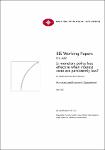Please use this identifier to cite or link to this item:
http://thuvienso.quochoi.vn/handle/11742/53166Full metadata record
| DC Field | Value | Language |
|---|---|---|
| dc.contributor.author | Claudio Borio, Economic Department | |
| dc.date.issued | 2017-04 | |
| dc.identifier.other | 31624 | |
| dc.identifier.uri | https://muontailieuso.quochoi.vn/DefaultBookView.aspx?BookID=31624 | |
| dc.identifier.uri | https://hdl.handle.net/11742/53166 | - |
| dc.description | Chính sách tiền tệ có trở nên kém hiệu quả hơn trong việc thúc đẩy tổng cầu và đầu ra trong các giai đoạn lãi suất liên tục thấp? Bài viết này phân tích lý do tại sao điều đó có thể là nguyên nhân và chứng minh trong thực tế tương ứng. | |
| dc.description.abstract | Chính sách tiền tệ có trở nên kém hiệu quả hơn trong việc thúc đẩy tổng cầu và đầu ra trong các giai đoạn lãi suất liên tục thấp? Bài viết này phân tích lý do tại sao điều đó có thể là nguyên nhân và chứng minh trong thực tế tương ứng. | - |
| dc.format | ||
| dc.format.extent | 33 trang | |
| dc.language.iso | en | |
| dc.publisher | Bank for international settlements | |
| dc.rights | Bank for international settlements | |
| dc.source | www.bis.org | |
| dc.source | www.bis.org | - |
| dc.subject | Monetary policy | |
| dc.subject | Chính sách tiền tệ | |
| dc.subject | Low interest rates | |
| dc.subject | Lãi suất thấp | |
| dc.title | Is monetary policy less effective when interest rates are persistently low? | |
| dc.type | Chuyên đề nghiên cứu | |
| Appears in Collections: | Phân quyền - Tài chính - Ngân hàng - Chứng khoán | |
Files in This Item:
Items in DSpace are protected by copyright, with all rights reserved, unless otherwise indicated.

THƯ VIỆN QUỐC HỘI - VĂN PHÒNG QUỐC HỘI
Địa chỉ: Nhà Quốc Hội, Đường Độc Lập, Ba Đình, Hà Nội
Điện thoại: 080.41947
Email: thuvienquochoi@quochoi.vn




